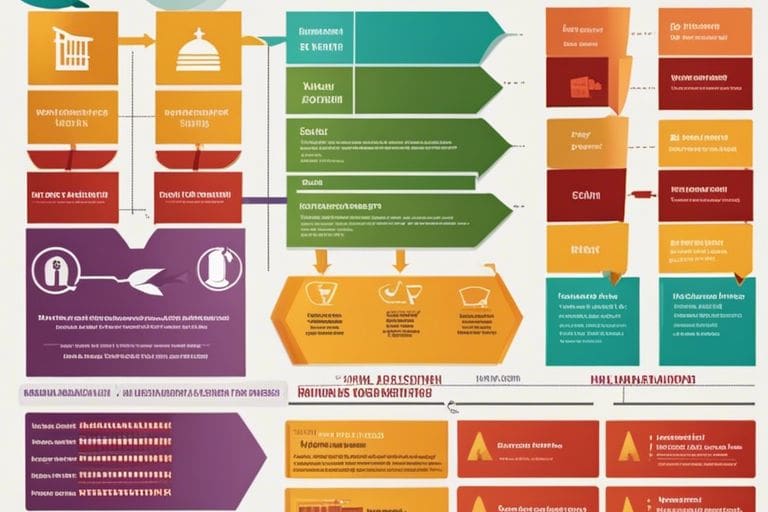Effective waste management is crucial for protecting the environment and public health. The legal frameworks governing waste management encompass a wide range of regulations and guidelines designed to ensure that waste is disposed of responsibly and sustainably. This article explores the essential aspects of waste management laws, providing valuable insights for businesses and environmental advocates.
Key Components of Waste Management Laws
Waste management laws cover various aspects of waste disposal, including the classification of waste, regulatory compliance, and enforcement mechanisms. These laws aim to minimize the environmental impact of waste and promote sustainable practices.
Classification of waste is a fundamental component of waste management laws. Waste is typically classified into different categories, such as hazardous waste, non-hazardous waste, and recyclable materials. Each category has specific disposal requirements to prevent environmental contamination and protect public health. For example, hazardous waste must be handled and disposed of according to strict guidelines to prevent harm to the environment and human health. Compliance with waste classification regulations is essential for ensuring that waste is managed responsibly.
Regulatory compliance involves adhering to the legal requirements for waste disposal and management. These requirements may include obtaining permits, maintaining records, and following specific procedures for waste handling and disposal. For businesses, compliance with waste management regulations is critical to avoid legal penalties and protect their reputation. Regulatory agencies, such as the Environmental Protection Agency (EPA), oversee the implementation and enforcement of waste management laws, conducting inspections and taking action against non-compliant entities.
Enforcement mechanisms are crucial for ensuring that waste management laws are followed. These mechanisms include inspections, monitoring, and penalties for violations. Regulatory agencies have the authority to conduct site visits, review records, and take enforcement actions against violators. Penalties for non-compliance can include fines, injunctions, and, in severe cases, criminal charges. Effective enforcement mechanisms help maintain compliance with waste management laws and promote environmental protection.
Sustainable Waste Management Practices
Sustainable waste management practices aim to minimize the environmental impact of waste and promote resource conservation. These practices involve reducing waste generation, recycling materials, and implementing environmentally friendly disposal methods.
Waste reduction is the first step in sustainable waste management. Businesses and individuals can reduce waste by adopting practices such as minimizing packaging, using reusable materials, and implementing efficient production processes. Legal frameworks often support waste reduction through incentives, such as tax breaks for businesses that implement waste reduction measures. Reducing waste at the source helps decrease the overall volume of waste that needs to be managed and disposed of.
Recycling is a key component of sustainable waste management, involving the collection, processing, and repurposing of materials that would otherwise be discarded. Legal frameworks for recycling may include requirements for businesses to separate recyclable materials from non-recyclable waste and to use certified recycling facilities. Recycling not only conserves resources but also reduces the environmental impact of waste disposal. Public awareness campaigns and educational programs can help promote recycling and increase participation rates.
Environmentally friendly disposal methods include composting organic waste, using waste-to-energy technologies, and safely disposing of hazardous materials. Composting converts organic waste into valuable soil amendments, reducing the need for chemical fertilizers and enhancing soil health. Waste-to-energy technologies generate energy from waste, reducing the volume of waste sent to landfills and providing a renewable energy source. Safe disposal of hazardous materials involves using specialized facilities and following strict guidelines to prevent environmental contamination.
Compliance with Waste Management Regulations
Compliance with waste management regulations is essential for businesses to avoid legal penalties, protect their reputation, and contribute to environmental sustainability. Implementing effective compliance programs, conducting regular audits, and staying informed about regulatory changes are critical steps in maintaining compliance.
Compliance programs help businesses adhere to waste management regulations and industry standards. These programs should include policies and procedures for waste classification, handling, storage, and disposal. Training employees on compliance requirements and conducting regular compliance audits are essential for identifying and addressing potential issues. Compliance programs should also include record-keeping practices to document waste management activities and demonstrate compliance to regulatory agencies.
Regular audits are a crucial component of compliance. Audits help businesses assess their adherence to legal and regulatory requirements, identify gaps in compliance, and implement corrective actions. Conducting internal audits and engaging external auditors can provide an objective assessment of the business’s compliance status and help ensure that compliance programs are effective.
Staying informed about regulatory changes is vital for maintaining compliance. Regulatory environments are dynamic, and changes can have significant implications for waste management practices. Subscribing to industry newsletters, attending compliance seminars, and engaging with legal advisors can help businesses stay updated on regulatory developments and adjust their compliance programs accordingly.
Contract Law in Waste Management
Contract law plays a vital role in waste management, governing agreements related to waste disposal services, recycling contracts, and environmental remediation projects. Well-drafted contracts provide legal protection and clarity for all parties involved in waste management transactions.
Waste disposal service contracts outline the terms and conditions for the collection, transportation, and disposal of waste. These contracts specify the types of waste to be managed, the responsibilities of the service provider and the client, and the pricing structure. Legal safeguards in waste disposal service contracts include provisions for compliance with regulatory requirements, environmental protection measures, and dispute resolution mechanisms. Ensuring that waste disposal service contracts are legally sound and enforceable helps mitigate risks and prevent disputes.
Recycling contracts involve agreements for the collection, processing, and sale of recyclable materials. These contracts should clearly define the responsibilities of the parties, the types of materials to be recycled, and the revenue-sharing arrangements. Legal frameworks supporting recycling contracts include provisions for ensuring the quality and traceability of recycled materials, compliance with environmental regulations, and mechanisms for resolving disputes.
Environmental remediation contracts govern projects aimed at cleaning up contaminated sites and restoring environmental quality. These contracts specify the scope of work, performance standards, and payment terms. Legal safeguards in environmental remediation contracts ensure that remediation activities are conducted according to best practices and regulatory requirements. Effective contract management helps achieve environmental remediation objectives and protects the interests of all parties involved.
Intellectual Property in Waste Management
Intellectual property (IP) protection is an important aspect of waste management law, ensuring that innovations and proprietary knowledge related to waste management technologies and processes are safeguarded from unauthorized use and infringement.
Patents protect technological innovations in waste management, such as new methods for waste treatment, recycling technologies, and waste-to-energy systems. Patents grant the inventor exclusive rights to use, manufacture, and sell the invention, providing a competitive advantage. Registering patents for waste management innovations helps prevent unauthorized use and encourages investment in research and development.
Trademarks protect brand names, logos, and slogans associated with waste management products and services. Registering trademarks ensures that the brand is legally protected and prevents others from using similar marks that could cause confusion. Trademarks help build brand recognition and trust among consumers, supporting the marketing and sale of waste management products and services.
Copyrights protect original works of authorship, such as publications, training materials, and software related to waste management. Copyright protection grants the creator exclusive rights to reproduce, distribute, and display the work. Registering copyrights provides legal recourse against unauthorized use and helps maintain control over proprietary knowledge and materials.
Data Privacy and Security in Waste Management
Data privacy and security are critical considerations in waste management, where organizations handle vast amounts of sensitive information related to waste generation, disposal, and compliance. Compliance with data protection laws and implementing robust security measures are crucial for protecting sensitive information and maintaining trust.
Compliance with data protection laws, such as the General Data Protection Regulation (GDPR) and the California Consumer Privacy Act (CCPA), is essential for protecting personal data and maintaining trust. Waste management organizations must implement robust data protection measures, including encryption, access controls, and regular security audits, to prevent data breaches and ensure compliance with legal requirements.
Data security measures include protecting sensitive information related to waste management operations, such as waste tracking data, compliance records, and proprietary technologies. Ensuring that data is securely stored, transmitted, and accessed only by authorized personnel helps prevent unauthorized use and cyber threats. Implementing best practices for data security, such as multi-factor authentication and regular security training for staff, enhances the overall security posture of waste management organizations.
Staff training on data privacy and security is essential for creating a culture of data protection within waste management organizations. Employees should be aware of data protection policies, understand the importance of safeguarding sensitive information, and know how to respond to data breaches. Providing ongoing training and updates on data protection best practices helps maintain compliance and protect sensitive information.
Employment Law in Waste Management
Employment law provides essential legal safeguards for both employers and employees in the waste management sector, ensuring fair treatment, protecting rights, and promoting a positive work environment.
Employee rights and protections are fundamental aspects of employment law. These rights include fair wages, safe working conditions, protection from discrimination and harassment, and the right to privacy. Laws such as the Fair Labor Standards Act (FLSA) and the Occupational Safety and Health Act (OSHA) establish standards for wages, working hours, and workplace safety. Ensuring compliance with these laws helps employers avoid legal disputes and fosters a positive work culture.
Workplace discrimination and harassment laws protect employees from unfair treatment based on race, gender, age, disability, and other protected characteristics. Employers must implement anti-discrimination policies, provide training on preventing harassment, and establish procedures for reporting and addressing complaints. Creating an inclusive and respectful work environment not only complies with legal requirements but also enhances employee morale and productivity.
Employment contracts play a crucial role in defining the terms and conditions of employment. Contracts should include provisions for job responsibilities, compensation, benefits, confidentiality, and termination procedures. Clear and comprehensive employment contracts help prevent disputes and ensure that both employers and employees understand their rights and obligations.
Environmental Impact Assessments (EIAs)
Environmental Impact Assessments (EIAs) are critical tools in waste management law, required before initiating significant waste management projects. EIAs evaluate the potential environmental effects of proposed activities, helping to identify and mitigate negative impacts. The EIA process typically involves scoping, baseline studies, impact prediction, mitigation measures, and public consultation.
The significance of EIAs lies in their ability to ensure that waste management projects are planned and executed sustainably. By assessing the potential impacts on air quality, water resources, soil quality, and local communities, EIAs provide a comprehensive understanding of the environmental consequences of waste management activities. Legal frameworks often mandate EIAs for activities such as landfill development, incineration facilities, and hazardous waste treatment plants, ensuring that environmental considerations are integrated into decision-making processes.
Implications of EIAs in waste management law include the requirement for project proponents to implement mitigation measures and monitor their effectiveness. EIAs also provide a basis for public participation in environmental decision-making, allowing stakeholders to express their concerns and contribute to the development of sustainable waste management practices. Compliance with EIA requirements helps prevent environmental degradation, promote transparency, and enhance the social acceptability of waste management projects.
Liability and Penalties for Non-Compliance
Liability and penalties for non-compliance with waste management laws are significant aspects that businesses must consider. Non-compliance can result in severe legal and financial consequences, including fines, sanctions, and criminal charges.
Fines and sanctions are common penalties for violating waste management regulations. Regulatory agencies, such as the EPA, have the authority to impose fines for non-compliance with waste classification, handling, and disposal requirements. Sanctions may also include the suspension or revocation of permits, restricting a business’s ability to operate. Ensuring compliance with waste management laws helps businesses avoid these penalties and maintain their reputation.
Criminal charges can be brought against individuals or organizations for severe violations of waste management laws, such as illegal dumping of hazardous waste or falsifying waste management records. Criminal charges can result in imprisonment, significant fines, and long-term damage to a business’s reputation. Legal frameworks provide mechanisms for investigating and prosecuting these violations, emphasizing the importance of adhering to waste management regulations.
Legal liabilities also include civil lawsuits brought by affected parties, such as local communities or environmental organizations. These lawsuits may seek compensation for environmental damage, health impacts, and other harms caused by non-compliance with waste management laws. Businesses must implement robust compliance programs and maintain accurate records to defend against potential legal liabilities.
International Waste Management Laws
International waste management laws play a crucial role in regulating the transboundary movement and disposal of waste. International treaties and agreements establish common standards and promote cooperation between countries to manage waste sustainably.
The Basel Convention is a key international treaty that regulates the transboundary movement of hazardous wastes and their disposal. The Basel Convention aims to protect human health and the environment from the adverse effects of hazardous waste by minimizing its generation and ensuring environmentally sound management. Countries that are parties to the Basel Convention must adhere to its requirements, including obtaining prior informed consent for the export and import of hazardous waste and ensuring proper waste management practices.
The Stockholm Convention on Persistent Organic Pollutants (POPs) is another important international agreement that aims to eliminate or reduce the release of POPs, which are harmful chemicals that persist in the environment and accumulate in living organisms. The Stockholm Convention requires countries to implement measures to reduce or eliminate the production, use, and release of POPs, including proper waste management practices for POP-containing materials.
The Rotterdam Convention promotes shared responsibility and cooperative efforts in the international trade of certain hazardous chemicals and pesticides. The Rotterdam Convention establishes a Prior Informed Consent (PIC) procedure, which requires countries to provide information and obtain consent before exporting hazardous chemicals covered by the Convention. Proper waste management practices for these chemicals are essential to prevent environmental contamination and protect public health.
Environmental Justice
Environmental justice is a critical aspect of waste management law, addressing the disproportionate impact of waste management practices on marginalized communities. Environmental justice seeks to ensure that all communities, regardless of race, ethnicity, or socioeconomic status, have equal protection from environmental hazards and equal access to decision-making processes.
Legal protections for marginalized communities include laws and policies that prevent the siting of waste facilities in vulnerable areas, ensure fair distribution of environmental benefits and burdens, and promote community participation in environmental decision-making. The Environmental Protection Agency (EPA) and other regulatory agencies have programs and initiatives to address environmental justice concerns and ensure that affected communities are involved in the regulatory process.
Community involvement is essential for achieving environmental justice in waste management. Legal frameworks support community engagement by requiring public participation in environmental impact assessments, permitting processes, and policy development. Engaging with communities helps identify local concerns, build trust, and develop more effective and equitable waste management solutions.
Corporate Social Responsibility (CSR)
Corporate Social Responsibility (CSR) is an important aspect of waste management law, encouraging businesses to adopt sustainable practices and contribute to environmental protection. CSR involves voluntary actions by businesses to go beyond legal compliance and address social, environmental, and economic impacts.
Sustainable waste management practices promoted through CSR include waste reduction, recycling, and environmentally friendly disposal methods. Businesses can set sustainability goals, implement green initiatives, and report on their environmental performance to demonstrate their commitment to CSR. Legal frameworks may provide incentives for businesses to adopt CSR practices, such as tax benefits, public recognition, and regulatory flexibility.
Transparency and accountability are key components of CSR. Businesses should communicate their waste management practices and sustainability achievements to stakeholders, including customers, employees, investors, and the public. Transparency helps build trust and enhances the business’s reputation, while accountability ensures that CSR commitments are meaningful and effective.
Emerging Technologies in Waste Management
Emerging technologies are transforming waste management practices, offering new solutions for waste reduction, recycling, and disposal. Legal frameworks must address the adoption and regulation of these technologies to ensure that they are implemented responsibly and sustainably.
Artificial Intelligence (AI) and machine learning are being used to optimize waste sorting, identify recycling opportunities, and improve waste collection efficiency. Legal considerations for AI in waste management include data privacy, algorithm transparency, and liability for decision-making errors. Regulatory agencies may need to develop guidelines for the use of AI to ensure that it aligns with environmental and ethical standards.
Blockchain technology offers potential benefits for waste management by providing transparent and secure tracking of waste materials. Blockchain can enhance supply chain transparency, prevent illegal dumping, and support waste certification schemes. Legal frameworks for blockchain in waste management should address data security, interoperability, and regulatory compliance.
Advanced recycling technologies, such as chemical recycling and waste-to-energy systems, offer new ways to recover value from waste materials. Legal considerations for these technologies include ensuring environmental safety, compliance with waste management regulations, and addressing potential health impacts. Regulatory agencies may need to update standards and guidelines to accommodate these emerging technologies.
Public Health and Safety Regulations
Public health and safety regulations intersect with waste management laws, ensuring that waste disposal practices protect human health and the environment. These regulations set standards for waste handling, storage, transportation, and disposal to minimize risks to workers and the public.
Occupational health and safety standards protect workers involved in waste management activities from exposure to hazardous materials, physical injuries, and other risks. Regulations may include requirements for personal protective equipment (PPE), safety training, and workplace hazard assessments. Compliance with occupational health and safety standards helps prevent workplace accidents and ensures a safe working environment.
Public health regulations aim to prevent environmental contamination and protect communities from the adverse effects of waste disposal. These regulations may include guidelines for landfill management, waste treatment, and pollution control. Ensuring compliance with public health regulations is essential for preventing environmental health hazards and promoting community well-being.
Emergency response and preparedness are critical aspects of public health and safety in waste management. Legal frameworks may require waste management facilities to develop and implement emergency response plans for incidents such as fires, chemical spills, and natural disasters. Preparedness measures include regular drills, communication protocols, and coordination with local emergency services. Effective emergency response and preparedness help mitigate the impact of incidents and protect public health.
Conclusion
Waste management laws encompass a wide range of legal frameworks and regulations designed to govern the disposal, treatment, and recycling of waste. Understanding and complying with these legal guidelines is essential for protecting the environment, ensuring public health, and promoting sustainable practices. By staying informed about legal requirements, implementing effective compliance programs, and engaging with legal professionals, waste management organizations can navigate the complex legal landscape and safeguard their interests. Through careful planning and adherence to best practices, businesses and consumers can contribute to the sustainable management of waste resources and protect the environment for future generations.





















